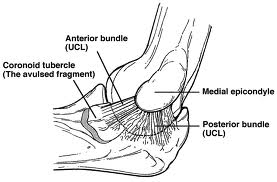Classification And Treatment of Elbow Fractures: Fractures of the coronoid process of the ulna were earlier thought to be an avulsion fracture involving the brachial is muscle. Of late, this notion has been dispelled as it is found that the insertion of this muscle is more distal.
Fractures of the coronoid process of the ulna were earlier thought to be an avulsion fracture involving the brachial is muscle. Of late, this notion has been dispelled as it is found that the insertion of this muscle is more distal.
Interesting Facts About Coronoid Fractures
- Its presence indicates a significant trauma to the elbow.
- It also points towards the possibility of acute recurrent dislocations.
Mechanism of Injury
This fracture occurs due to the impact of the coronoid process against the trochlea following a fall on an outstretched hand.
Classification of Regan and Morrey
- Type I: Avulsion fracture of the tip of the coronoid.
- Type II: Fracture involving greater than 50 percent of the coronoid.
- Type III: Fracture involving the base of the coronoid.
Clinical Features
Isolated fractures of the coronoid process are usually rare and are usually associated with greater elbow trauma. Clinical features like pain, swelling, deformity, movement restriction of the elbow, etc. depends on the extent of damage.
Radiograph
This fracture can be easily identified over a true lateral X-ray of the elbow.
Treatment
- Though small-undisplaced fractures can be managed conservatively with an above elbow plaster cast, displaced fractures need open reduction and internal fixation with screw or wires.
- A physician might be able to reattach a division or repair a damaged bone, but it often takes actual recovery to restore a person’s function.
- Physical Therapy treatment, in most cases, contains direct modification of muscles, joint parts and other parts of the body affected by a harm or serious sickness.
- It often contains body building, heat treatments, massages therapy and supervised exercises.
- Individual workouts often depend on the type of harm or condition, the person’s age and specific treatments recommended by a doctor.
If you are suffering from elbow fracture then come instantly our center Active Physical Therapy. For more detailed information Call Now at: 301-498-1604.